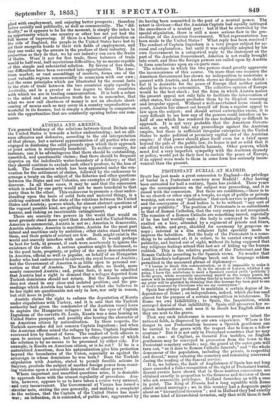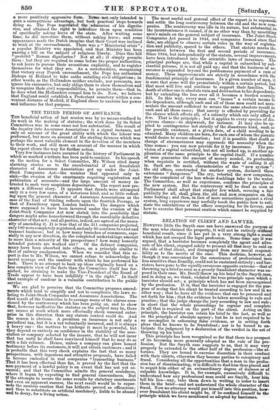PROTESTANT BURIAL AT MADRID.
SPAIN has just made a great concession to England—the privilege of burial in a Prptestant cemetery near Madrid! After having been entreated for half a century, Spain has yielded. Three years ago the correspondence on the subject was proceeding, and it is closed with the concession. But there are conditions,—there is to be no church or other sign of a temple, no sign of public or private worship, not even any " indication" that such service is performed; and the conveyance of dead bodies is to be without "any sort of pomp or publicity." The position of Protestants is so subordinate to that of Roman Catholics, that the very corpse is not recognized. The remains of a Roman Catholic are something sacred, especially if he has had worldly rank : the body is conveyed to the tomb, exalted on a bier, attended by a regiment of priests and friars, black, white, and grey, shielded for ceremony by gorgeous ca- nopy; interred in a dim religions light specially made to impress the beholders. But the body of the Protestant is a some- thing to be ashamed of; it is refuse, to be carried away without publicity, and buried out of sight, without its being supposed that any religions feelings attend that last act of hiding up the human rubbish. This is the relative position of the Protestant and the Roman Catholic according to the Spanish views. No wonder that Lord Howden's indignant feelings break out in language seldom permitted to the measured phrase of diplomacy— "I hasten to finish this communication, as it is impossible to make it without a feeling of irritation. If, in the streets of London, whither I am going, I have the misfortune to meet a Spaniard carried (with 'publicity') to the grave, while reverently uncovering myself as the corpse passes, my sorrow will be tempered by the feeling that he is buried like a Christian, and my pride will be gratified by thinking that this homage has been paid to one of God's creatures by Christians who are my countrymen." Spain has always professed to maintain a certain degree of in- dependence of Rome ; an independence, indeed, which she has used almost for the purpose of a certain competition in intolerance. To Rome we owe Infallibility ; to Spain, the Inquisition, which scourged denial of that infallibility. Spain still preserves her re- ligious independence, and uses it to insult her English allies as they are sent to the grave.
That any such intolerance is necessary to preserve intact the national faith, is disproved by our own experience. Where is the danger to our Protestantism because a Spanish gentleman can be carried to the grave with the respect due to him as a fellow creature ? But it is not only in Protestant countries that we may find a case : at Cagliari, as General Fox testifies, an English gentleman may be conveyed in procession from the town to the Protestant cemetery outside ; nay, the guard at the outer gate will turn out, "as it does to Roman Catholic funerals," and "the whole demeanour of the population, including the priests, is respectful and decent," many entering the cemetery and remaining uncovered during the reading of the funeral service. It is, we believe the fault of Englishmen if Spain has not long since conceded a fuller recognition of the right of Protestant burial Recent events have shown that in these matters concessions are obtained exactly in proportion to the firmness and decision of those who ask reasonable privileges. Holland furnishes us with a ease in point. The King of Prussia had a long squabble with Rome about mixed marriages ; we in this country had a desperate path') about an " hierarchical invasion " ; and in Holland they had exactly the same kind of hierarchical invasion, only that with them it took
a more positively aggressive form. 2.41kit Emit, only intended to gain a surreptitious advantage, but took practical steps towards doing so. The Pope negotiated the admission of his dignita- ries, and obtained the right to introduce them upon condition of specifically asking leave of the state. After waiting some time, he did introduce them, without asking leave ; and some appearances made the Dutch imagine that their Court was inclined to wink at the encroachment. There was a" Ministerial crisis"; a popular Ministry was appointed, and that Ministry has been passing a bill on the subject of religious liberty. Does thishill " prohibit " Roman dignitaries? Not at all ; it simply permits them : but they are required to come before the proper authorities, to ask leave to pursue their avocations explicitly, and to register themselves for what they are. As a oorroborative:, recognizing that victory over Popish encroachment, the Pope has authorized Bishops in Holland to take oaths entailing civil obligations; in other words, as the Hollanders neither exclude, nor persecute, nor ignore his emissaries, but only oblige them to show themselve8 and to recognize their civil responsibilities, he permits them—that is, he does what the Hollanders compel him to do. Now, we believe that England could establish a Protestant cemetery within a con- venient distance of Madrid, if England chose to exercise her power and influence for that purpose.



























 Previous page
Previous page